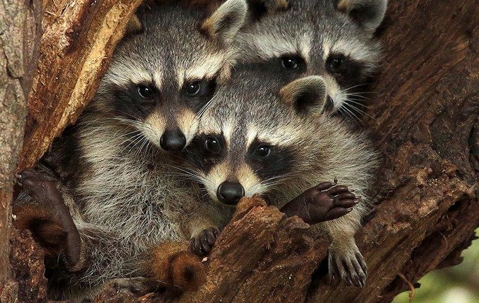Few pests are as intrinsically tied to urban America as the raccoon. These scavenging invaders have given many homeowners headaches but they also pose greater dangers to your health and property than you may realize. Learning how to spot the signs and prevent an infestation can aid you in protecting your property.
What To Know About Raccoons
Raccoons are mid-sized mammals that are native to North America, typically growing to a couple of feet in length. They are most identifiable by their black, ring-like mask markings on their faces, in addition to their clutching paws. While their natural habitats are coastal and mountainous forests, raccoons have adapted to live in a number of different environments thanks to urban sprawl. Anywhere there is human food and waste, omnivorous raccoons usually aren’t far off. Civilization also provides raccoons with ample hiding and nesting spots, utilizing debris in yards and industrial lots. It’s this ability to thrive off of human activity that makes raccoons such a common pest. Many property owners have had to contend with them invading their yard.
The Dangers Of Raccoons
Raccoons aren’t just nuisance pests, they pose serious risks to your property and your well-being. As creatures that root around in the trash and feed on waste, it’s no surprise that they pose health risks to people and pets. However, you may not be aware of just how dangerous raccoons can be. Here are some of the issues they may cause:
- Damage: Outdoors, raccoons can damage fences and yard features to gain access, not to mention exterior utilities that they may crawl atop or mess with. If they make it inside of a structure, they can damage wall panels, insulation, and electrical wiring, in addition to the regular staining that their urine and feces cause.
- Disease: Raccoons carry several dangerous diseases, which they can spread through bites, scratches, and other physical interactions. Viral diseases spread by raccoons are particularly harmful to dogs, who can contract rabies and hepatitis.
- Parasites: Even if a raccoon isn’t sick with or carrying a disease, it may still have fleas, ticks, and other parasites that can be transmitted to pets and contribute to the spread of other pathogens.
Raccoon Prevention For Your Property
Rather than wait for a raccoon problem to become apparent, it’s best to take steps to protect your property in advance. Proper prevention can give you a leg up on pest invasions and help limit the damage that they cause. Here are some useful tips:
- Trash Storage: Raccoons dig through the garbage to gather morsels of food, therefore trash bins need to be well-secured.
- Fencing: Putting a fence up around your yard can help repel invasive pests, but note that raccoons are good climbers and can scale even tall fences. Regularly inspecting for holes or faults in chain-link or wooden fencing will help make sure they don’t have an easy way into your yard.
- Fortification: If raccoons have invaded your yard, they can easily find ways inside of structures. Ensuring there aren’t easily accessible vents, windows and dig-points will help make sure raccoons don’t find a way in.
Superior Methods Come From Pest Professionals
Raccoons are dangerous and resilient pests, able to survive on scraps and withstand most at-home methods of removal. To truly stay protected from destructive raccoons, the best course of action is to turn to the professionals. At Pest Pro Pest Control, our trained experts can provide you with more tips for preventing and addressing raccoon problems. If a population is already encroaching on your yard, it’s important to turn to the professionals quickly, before it gets out of hand. For superior protection from raccoons and other invasive pests, trust Pest Pro Pest Control to keep your property safe.

